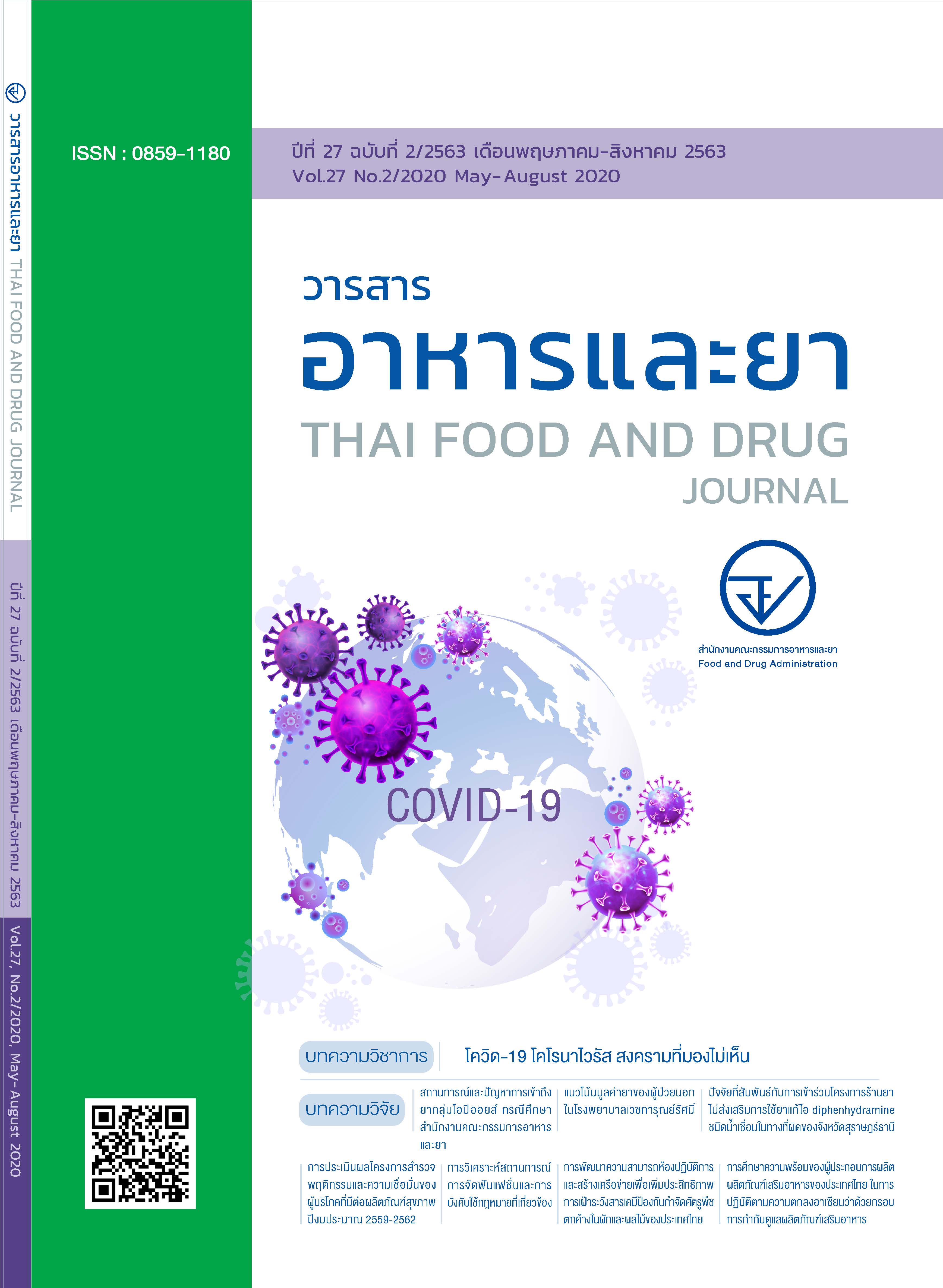ปัจจัยที่สัมพันธ์กับการเข้าร่วมโครงการร้านยาไม่ส่งเสริมการใช้ ยาแก้ไอ Diphenhydramine ชนิดนํ้าเชื่อมในทางที่ผิด ของจังหวัดสุราษฎร์ธานี
Main Article Content
บทคัดย่อ
การวิจัยนี้มีวัตถุประสงค์ เพื่อศึกษาปัจจัยที่สัมพันธ์กับการเข้าร่วมโครงการร้านยาไม่ส่งเสริมการใช้ยาแก้ไอ
diphenhydramine ชนิดน้ำเชื่อมในทางที่ผิดของจังหวัดสุราษฎร์ธานี ผู้วิจัยส่งแบบสอบถามชนิดที่ให้ตอบเอง
แก่เจ้าของกิจการร้านยาแผนปัจจุบันทุกแห่งในจังหวัดสุราษฎร์ธานี จำนวน 462 แห่ง แบบสอบถามประกอบด้วย
คำถามเกี่ยวกับข้อมูลทั่วไป การเข้าร่วมโครงการฯ ในปัจจุบัน ความตั้งใจในการเข้าร่วมโครงการฯ ในอนาคต
ทัศนคติต่อการเข้าร่วมโครงการฯ บรรทัดฐานของการเข้าร่วมโครงการฯ ความยากลำบากในการเข้าร่วมโครงการฯ
ประโยชน์ของการเข้าร่วมโครงการฯ ความคิดของบุคคลที่มีความสำคัญต่อการเข้าร่วมโครงการฯ และข้อเสีย
ของการเข้าร่วมโครงการฯ ผลการวิจัย พบว่ามีตัวอย่าง 138 รายตอบแบบสอบถาม (ร้อยละ 29.87) เจ้าของร้านยา
ตั้งใจในการเข้าร่วมโครงการฯ 121 ราย (ร้อยละ 88.3) และการเป็นสมาชิกชมรมร้านยาจังหวัดสุราษฎร์ธานี
มีความสัมพันธ์กับการเข้าร่วมโครงการฯ ในปัจจุบันอย่างมีนัยสำคัญทางสถิติ (P<0.05) ด้านความสัมพันธ์ของปัจจัย
ทางจิตวิทยากับความตั้งใจในการเข้าร่วมโครงการของเจ้าของร้านยา พบว่า ทัศนคติ บรรทัดฐานของการเข้าร่วม
โครงการฯ ประโยชน์ของการเข้าร่วมโครงการฯ และความคิดของบุคคลที่มีความสำคัญ มีความสัมพันธ์กับการ
เข้าร่วมโครงการฯ อย่างมีนัยสำคัญทางสถิติ (P<0.05) นอกจากนี้ผลการวิเคราะห์ถดถอยพหุคูณเพื่อหาปัจจัย
ที่สัมพันธ์กับการตัดสินใจในการเข้าร่วมโครงการฯ พบว่า ทัศนคติเป็นตัวแปรอิสระเพียงตัวเดียวที่มีผลต่อตัวแปรตาม
(สามารถใช้พยากรณ์) อย่างมีนัยสำคัญทางสถิติ (P<0.05) สรุปได้ว่าสำนักงานสาธารณสุขจังหวัดสุราษฎร์ธานี
ควรจัดทำโครงการฯ เนื่องจากร้านยามีการตอบรับการเข้าร่วมโครงการฯ สูง วิธีการที่สามารถใช้เพื่อลดอุปสรรค
ในเข้าร่วมโครงการฯ คือการกระตุ้นทัศนคติ จะสามารถทำให้ร้านยามีความต้องการในการเข้าร่วมโครงการมากขึ้น
และสำนักงานสาธารณสุขจังหวัดสุราษฎร์ธานีควรนำเสนอโครงการฯ ผ่านชมรมร้านยาเพื่อสร้างร้านยาหรือรูปแบบ
การแก้ปัญหาการใช้ยาในทางที่ผิดอย่างเป็นรูปธรรมในร้านยา
Article Details
เอกสารอ้างอิง
2. Thai Health Promotion Foundation. “Addiction”New generation [Internet]. 2009 [cited 2018 Feb 10]. Available from: www.thaihealth.or.th 50 THAI FOOD AND DRUG JOURNAL : MAY-AUGUST 2020
3. Naewna. “Diphenhydramine syrup” substrate “4 x 100” Modified drugs…New evil [Internet].2011 [cited 2018 Feb 10]. Available from:www.naewna.com
4. Nisa Chaikun. Sources of Cough MedicinesAbused by the Addicts in a Southern Province.Thai Journal of Pharmacy Practice 2017 ;92:516-524.
5. Sujit S Sansgiry, Archita H Bhansali, ShwetaS Bapat, Qingqing Xu. Abuse of over-thecountern medicines: a pharmacist's perspective. Integrated Pharmacy Research and Practice 2017;6:1-6.
6. Summary of the meeting of the Head ofCommunity Pharmacy and Consumer Protection; 2017 Oct ; Suratthani, Thailand.Suratthani:Angsana;2017.p.1-5.
7. Food and Drug Administration Announcement.Rules, methods and conditions to sell drugs.Government Gazette, Booklet 132, extra 179 (Sep 4, 2005).
8. Matichon Online. Mass protest demonstration against drugstores selling antitussive to teenagers for making 4x100 in Chwang, Nakhon Sri Thummarar. 2017 [cited 2018 Feb 10]. Available from: www.matichon.co.th
9. Jurairat Khonglormyati. Factors Associated with the Participation in the Project on Development of Health Services within Pharmacies among Drugstores in the 4th Health Region. Thai Journal of Pharmacy Practice 2016;82:359-369.
10. Zaprutko, T., D. Koligat, et al. "Misuse of OTC drugs in Poland". Health Policy 2016 ; 120(8):875-81.


